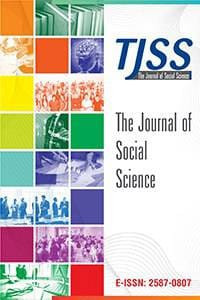A CONSTRUCTIVIST ANALYSIS OF THE IMPACT OF INDIA’S DOMESTIC IDENTITIES ON ITS NEIGHBOURHOOD POLICIES TOWARDS SOUTH ASIA
Domestic factors especially national identities of a Nation State influence its foreign policy by distinguishing that country’s perception of “self” from that of “others”. By employing the case study of India, this paper assesses the way India perceives its national identities and the resultant effects on its foreign policies towards South Asia. The paper assesses that in India, its peculiar political construct superimposed by British colonizers and multiple ethno-religious groups stacked together under a Hindutva-inspired political system serve as an aberration from the evolution of indexical “self” of different nationalities in that country. Accordingly, India’s national identity formation is premised on “exclusion” and it attempts to overcome this challenge through externalization of its internal problems towards neighbourhood.
Anahtar Kelimeler:
Constructivist Approach, Externalizing Internal Challenges, Hindutva, Transnational Group, National Identity, Domestic Identities, Neighbourhood Policies
A CONSTRUCTIVIST ANALYSIS OF THE IMPACT OF INDIA’S DOMESTIC IDENTITIES ON ITS NEIGHBOURHOOD POLICIES TOWARDS SOUTH ASIA
Domestic factors especially national identities of a Nation State influence its foreign policy by distinguishing that country’s perception of “self” from that of “others”. By employing the case study of India, this paper assesses the way India perceives its national identities and the resultant effects on its foreign policies towards South Asia. The paper assesses that in India, its peculiar political construct superimposed by British colonizers and multiple ethno-religious groups stacked together under a Hindutva-inspired political system serve as an aberration from the evolution of indexical “self” of different nationalities in that country. Accordingly, India’s national identity formation is premised on “exclusion” and it attempts to overcome this challenge through externalization of its internal problems towards neighbourhood.
Keywords:
Constructivist Approach, Externalizing Internal Challenges, Hindutva, Transnational Group, National Identity, Domestic Identities, Neighbourhood Policies,
___
- Iffat Naheed, Școala Națională de Studii Politice și Administrative (SNSPA), Bucharest, Romania
- Yayın Aralığı: Yılda 2 Sayı
- Başlangıç: 2017
- Yayıncı: Cenk AKSOY
Sayıdaki Diğer Makaleler
COVİD-19’UN DÜNYA VE TÜRKİYE DIŞ TİCARETİNE ETKİLERİ
İbrahim Bora ORAN, Munir GOKMEN
HUMAN RIGHTS IN UN COUNTER-TERRORISM DEBATE: IMPERATIVE OR IMPEDIMENT
İNGİLTERE’Lİ TÜRK-MÜSLÜMAN GENÇLERDE DİNDARLIK VE AHLAKÎ OLGUNLUK
CHINA’S ENCOUNTER WITH WEST IN THE 19TH CENTURY: POWER RELATIONS
Aslı AYDEMİR, Yazgım DEMİR AKYIL
REKABETÇİ ÖRGÜTLERDE MÜŞTERİ DAVRANIŞI: TÜKENMİŞLİK ALGISININ MÜŞTERİ SADAKATİNE ETKİSİ
H. Tezcan UYSAL, Sibel AYDEMİR
KONTEYNER LİMANLARINDA DİJİTAL DÖNÜŞÜM: KOCAELİ LİMANLARINDA BİR İNCELEME
